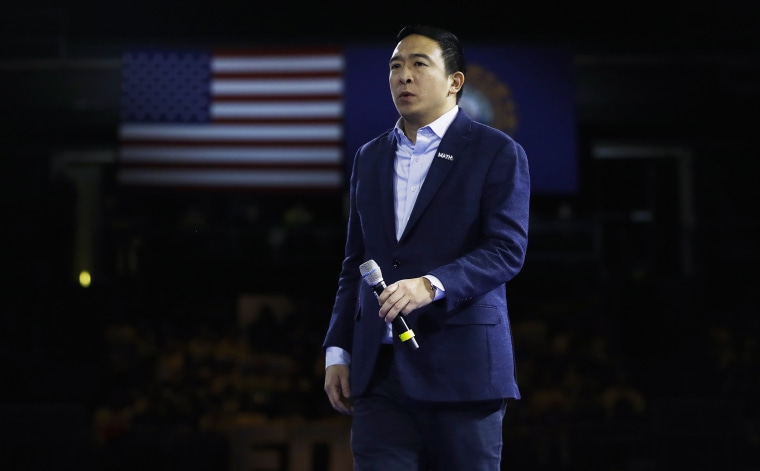Japanese American leaders are criticizing former Democratic presidential candidate Andrew Yang's call to Asian Americans to display patriotism during the coronavirus pandemic, saying it brings back painful memories of the rhetoric directed at Americans of Japanese ancestry who were incarcerated during World War II.
In an op-ed article published in The Washington Post this week, Yang called for Asian Americans to “embrace and show our American-ness in ways we never have before” as a response to anti-Asian racism fueled by the COVID-19 outbreak.
But some Japanese American groups say his words feel all too familiar, pointing out that their families were also encouraged to demonstrate their loyalty to America when they were forcibly removed from their homes and imprisoned in concentration camps by an order issued by President Franklin D. Roosevelt after Japan bombed Pearl Harbor in 1941.
“Reading it gave me a sense of deja vu,” Bruce Embrey, the co-chair of Manzanar Committee, a nonprofit organization dedicated to educating the public on Japanese American incarceration, told NBC Asian America of Yang's article.
In his op-ed, Yang addressed the increase in anti-Asian American racism as a result of the pandemic.
“We need to step up, help our neighbors, donate gear, vote, wear red white and blue, volunteer, fund aid organizations, and do everything in our power to accelerate the end of this crisis,” the entrepreneur wrote. “We should show without a shadow of a doubt that we are Americans who will do our part for our country in this time of need.”
Many experts and readers on Twitter said it shouldn't be the responsibility of Asian Americans to stop racism through a display of patriotism.
“The article brought back memories of elders telling us how they were instructed by organizations to be ‘good Americans,’ when just being American should have been enough,” Embrey said, referring to the period when Japan bombed Pearl Harbor in 1941 and Roosevelt signed Executive Order 9066, which provided for the forced mass removal and incarceration of more than 110,000 individuals of Japanese ancestry in violation of their constitutional rights as U.S. citizens.
Yang did not respond to a request for comment.
Tom Ikeda, the founding executive director of Densho — a nonprofit organization that offers an online encyclopedia specifically to share WWII incarceration history — also fact-checked one of the anecdotes Yang lauded as inspirational. Yang referenced the 442nd Regimental Combat Team and the 100th Infantry Battalion as examples of patriotism that Asian Americans today should follow. The groups were formed as segregated units of Japanese American soldiers to serve in the war.
Known as the most decorated unit in U.S. military history for its size and length of service, the unit also suffered casualties that added up to several times the number of people it rescued.
“During World War II, Japanese Americans volunteered for military duty at the highest possible levels to demonstrate that they were Americans,” Yang wrote. “Now many in the Asian American community are stepping up, trying to demonstrate that we can be part of the solution.”
However, not all soldiers volunteered willingly.
“While it’s true that the units started out recruiting volunteers, the government eventually drafted Japanese Americans from the concentration camps,” Ikeda said. “They were essentially drafting them out of prison and giving them no choice but to fight for the country that kept their families behind barbed wire.”
In response to Yang’s article, filmmaker and UCLA Asian American studies professor Renee Tajima-Peña posted a photo on Twitter of her uncle in military uniform, flanked by her grandparents. The photo was taken behind the barbed wire of Gila River, where her family was imprisoned. “My family served in US Army & wore red/white/blue. Didn't work out well for them.” the caption reads.
“Military service and laying down your life has never been the golden ticket into being accepted,” Tajima-Peña said. “It’s offensive to think that you have to risk your life to prove your belonging in this country. I’m proud of my dad, my uncles, and grandfather for their service, but these families paid a big price."
Experts also point out Yang’s praise of Japanese American soldiers leaves out the dissenters and protesters at each of the camps who actively resisted the draft. One infamous group, the Heart Mountain 63, who were incarcerated at the Heart Mountain camp, refused to fight until their rights were restored. They were arrested and convicted in the largest mass trial in Wyoming’s history.
“They knew that what the government was doing was unconstitutional and illegal, and to falsely incarcerate them and expect them to sacrifice their lives was wrong,” said Shirley Ann Higuchi, chair of the Heart Mountain Wyoming Foundation. “No American citizen should have to go to those lengths to prove their loyalty.”
While the media portrayed the Japanese American community post-war as the model minority for their ability to rebuild their lives without complaint, the children of camp survivors led a grassroots movement in the 1980s to demand reparations for their family’s incarceration. As a result, the Civil Liberties Act was signed by President Ronald Reagan in 1988, which granted redress of $20,000 and a formal apology to every Japanese American incarcerated during WWII.
For Tajima-Peña, the Asian American community’s swift social media response to reported attacks demonstrates the power of organizing — work that communities have been doing for decades. Notable Asian American actors and influencers have teamed together to create the #WashTheHate campaign, which strives to spread awareness of anti-Asian racism amid the pandemic and is supported by dozens of community organizations, including the Japanese American Citizens League.
“Andrew Yang may think the solution to racism is to be compliant, but fighting for one’s rights against the dominant narrative has been an integral part of our nation’s development,” Embrey said. “Fighting back is as American as you can get.”
